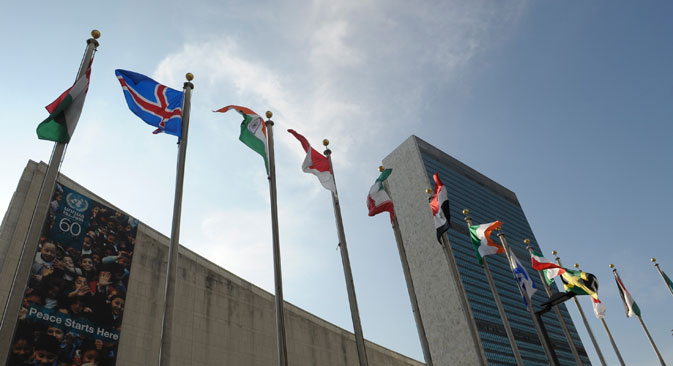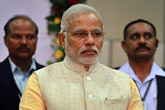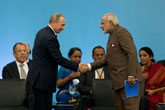Shoulder to shoulder at the United Nations

India and Russia have always been in solidarity at the UN. Source: Sergey Guneev / RIA Novosti
Several heads of state are converging in New York City for the 69th session of the United Nations General Assembly. While Narendra Modi will be addressing the session, Vladimir Putin has decided to give it a pass this year. It’s a well-known fact that members of the Russian and Indian permanent missions to the UN enjoy warm relations, largely reflecting the diplomatic ties between the two countries. Russia has clearly and consistently maintained that India deserves to be a permanent and veto-wielding member of the United Nations Security Council.
It’s at the United Nations that the friendship between the countries has been repeatedly put to test, with positive outcomes. In March of this year, when Ukraine proposed a resolution terming Crimea’s reintegration with Russia as illegal, India abstained from voting, resisting pressure from the U.S. and European Union. This abstinence was the latest in a series of measures at the UN where the two countries kept each other’s interests in mind.
It is a well-known fact that the Soviet Union backed India on the Kashmir issue. In the July 23, 1962 issue of Pakistani newspaper, the Russian veto against a UN Security Council-imposed solution of the Kashmir dispute was described in an articulate manner reflecting the journalism of the time. “At 10 minutes to 6 yesterday afternoon (10 minutes to 3am, Karachi time), the Soviet Union cast its veto in the United Nations Security Council and thus sealed for ever hopes of a peaceful solution of the Kashmir dispute under UN auspices,” the paper’s correspondent wrote. He added, “The long, determined hand of Russia’s tall balding Platon Morozov went up against the Irish resolution, and dented the long, ceaseless struggle of Kashmir for its liberation.”
The veto on Kashmir took place just 7 months after Moscow decided to veto a U.S.-sponsored resolution demanding that India withdraw from Goa, after the state was liberated from Portuguese occupation. Just three other countries voted against the resolution: Ceylon (Sri Lanka), Liberia and the Arab Republic (a political union between Egypt and Syria). The Americans and their European allies believed that Goa belonged to Portugal! If it weren’t for the Russian veto, Goa would have appeared on Indian maps as a disputed territory. According to a UPI report, U.S. Ambassador to the UN, Adlai Stevenson II said after the veto, “We are witnessing the first act in a drama which could end with (the UN’s) death.” The Soviet Ambassador Valerian Zorin shrugged off those comments, labelling them “overdramatic,” while arguing that the days of colonialism were coming to an end.
Moscow used its veto famously in the 1971 Bangladesh War of Liberation, when the U.S. and its allies supported a West Pakistani regime that killed 3 million Bengalis! The Americans tried to push through a ceasefire to help the Pakistani Army, which was losing the war to India (and Bangladeshi Mukhti Bahini freedom fighters), but the USSR once again used its veto, telling its friend and ally to quickly finish off the war.
India, which has never been a permanent member of the United Nations Security Council, obviously never had the kind of clout that Moscow has enjoyed in the UN. However, there are several instances when New Delhi refused to support motions against the Soviet Union. In the wake of the Prague Spring and the Warsaw Pact intervention in Czechoslovakia in 1968, India abstained from voting in a resolution condemning the Soviets.
There were also instances when the two countries adopted common stances at the United Nations against Western colonisers. During the Suez Crisis of 1956, India, the USSR and the Republic of China (Taiwan) were the only countries that abstained from condemning Egypt for nationalising the Suez Canal. Although the subsequent war resulted in a military defeat for Egypt, the Anglo-French coalition withdrew and this was what many historians considered the end of the British Empire.
Geo-political realities have changed since the 1970s and India now enjoys good political and diplomatic relations with countries that tried to destabilise it during the days of the Cold War, but New Delhi is more or less inclined to follow a balancing act when it comes to any new East-West conflict. What the previous regime, at its end, and the present Indian government have maintained is that ties with Russia will always be accorded a great degree of importance. The United Nations is one international body, where the countries will continue to cooperate for years to come.
It’s but obvious that Russia would like India on board the Security Council, but such reforms continue to look like a pipe dream. The next level in cooperation at this level would be to the working out of common BRICS strategies within the UN and for the reformation of the body to make it reflect contemporary realities.
All rights reserved by Rossiyskaya Gazeta.
Subscribe
to our newsletter!
Get the week's best stories straight to your inbox

